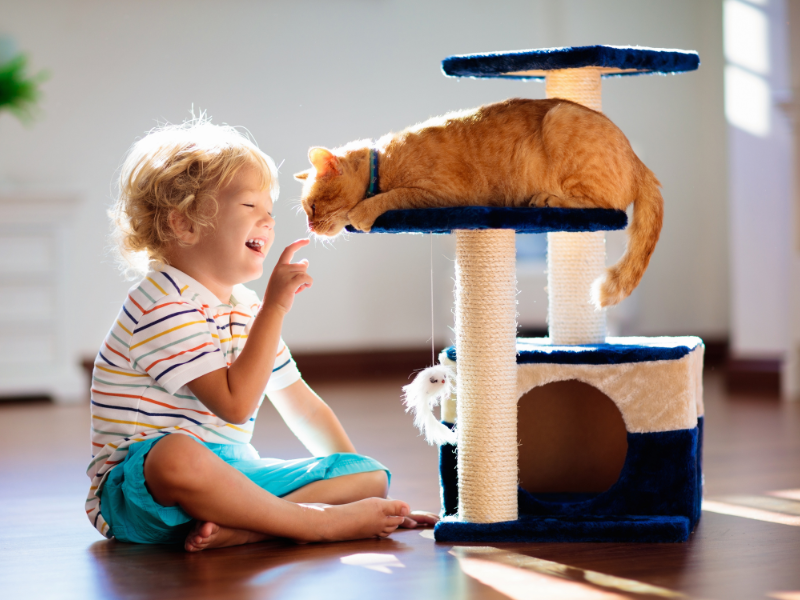Benefits of Having Pets for Children
Introducing a pet into your family can benefit your children in many ways. First, let’s take a look at three of the many ways pets can positively influence your child’s growth and development.
Emotional and Social Development
One of the most significant advantages of having pets is their impact on a child’s emotional and social skills. Animals provide unconditional love and companionship, which can be particularly comforting for children. They can help kids develop empathy, compassion, and a nurturing attitude. Pets also offer a sense of security and can aid in reducing stress and anxiety in children.
Physical Health Benefits
It’s not just mental and emotional health that benefits; pets can positively impact physical health, too. Engaging in play and outdoor activities with pets encourages children to be more active, promoting physical fitness. Interestingly, studies have shown that early pet exposure can reduce the risk of developing certain allergies and asthma.
Cognitive and Educational Advantages
Pets can also be great teachers. Caring for an animal requires responsibility and routine, valuable life skills for children to learn. Feeding, grooming, and looking after a pet’s health can teach kids about commitment and empathy. Additionally, interacting with pets can boost language skills and aid in reading development, as children often feel comfortable reading aloud to a non-judgmental, furry listener.
Concerns and Precautions of Raising Children and Animals
While pets can bring immense joy and numerous benefits, parents and caregivers must be aware of the potential concerns and necessary precautions. Addressing these issues head-on can ensure a safe and healthy relationship between your children and their pets.
Safety Concerns
While there are many benefits to owning pets with children, it’s crucial to address safety concerns. Young children, in particular, need to be taught how to interact safely with animals to avoid bites or scratches. Supervision is key, especially when children are learning how to handle pets gently and respectfully.
Health Risks
Health risks such as allergies and zoonotic diseases (illnesses that can be transmitted from animals to humans) are also important considerations. Regular veterinary care and good hygiene practices can mitigate many of these risks. For families with allergies, we advise you to consult with your pediatrician before getting a pet.
Time and Financial Commitments
Owning a pet is a long-term commitment in terms of time and finances. Families need to consider whether they can provide for the pet’s needs, including food, healthcare, and attention. This responsibility can be a great learning experience for children but requires adult supervision and involvement.

Choosing the Right Pet for Your Family
When considering adding a pet to your family, choosing one that fits well with your lifestyle, living situation, and the ages of your children is crucial. Different types of pets have varying needs and temperaments, so it’s essential to research and make an informed decision.
Consider Your Family’s Lifestyle
Think about your family’s daily routine and how much time you can dedicate to a pet. Some animals require more attention and exercise than others. Also, consider the available space – larger pets typically need more room to move around.
Age-Appropriate Pets
The age of your children plays a significant role in selecting the right pet. Younger children might do better with smaller, low-maintenance pets, whereas older children can handle more responsibility with larger animals.
Allergies and Health Considerations
If allergies are a concern in your family, certain pets might be more suitable than others. Hypoallergenic breeds or species can be a good option. Always consult with a healthcare provider, like your pediatrician, to discuss any health concerns related to pet ownership.










